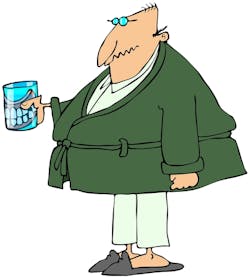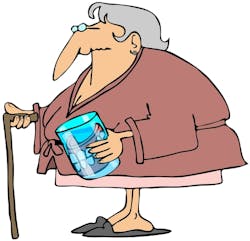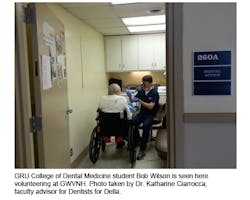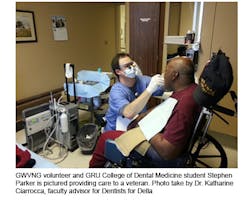A new way of looking at dental care for the elderly through "Dentists for Della"
By Lerin Madole
DentistryIQ Editorial Staff
Cartoons of the elderly carried some heavy realities for five-year-old me after I saw my great grandmother’s dentures for the first time. Before that moment, I had no idea that some people went around removing full sets of teeth from their heads as they pleased. I found hers wrapped in a tissue under her bed one evening when I was engaged in a particularly successful game of hide-and-seek. I came running from the room putting my small lungs to their loudest use. I thought my “Mammy” was falling apart in some strange way; I had to help her! My dad gathered me up on his knee and explained to me the common necessity for dentures among the elderly. He assured horrified little me that no, my teeth wouldn’t come out too, as long as I took good care of them.
Health-care options provided by the government are often available, but do not include dental care. In 2010, a Reuters Business Insurance report told us that “An estimated 45 million Americans do not have dental insurance … and recently passed health-care reform offers little direct help.” Retirement isn’t cheap and budget becomes a hindrance to the elderly in receiving the dental health care that they need. With age also comes limited mobility, which makes daily hygiene practices more difficult. Regular dental exams then become physically challenging as well, and the necessary accommodations for transportation are an added expense. All of these factors exponentially increase the risk for oral infection and tooth decay among the elderly, which can then lead to further health complications.
Unfortunately, given the aforementioned challenges, opting to have teeth removed tends to be a less physically and financially expensive option to our elderly. Having teeth removed rather than repaired also lowers the risk for further complication in the future. THIS is exactly why dentures are familiar to our society and commonly depicted in illustrations of older generations. When this is understood, those caricatures in the Sunday paper aren’t as funny. They depict a very unfortunate and very real truth. What can be done about this? What is being done about this? Can we get to a point where social recognition of the elderly doesn’t include false teeth in a glass of water?
The late Dr. Victor Della-Guistina was a founding faculty member of the College of Dental Medicine and a fitting namesake for the organization. GRU’s College of Dental Medicine releases a biannual magazine called Word of Mouth. Dr. Della was highlighted for his life’s work in the Spring 2013 issue after his recent death at the age of 94. “[He] moved to Augusta in 1957 as the city’s dental health director. He was responsible for having fluoride added to the Augusta area’s water supply and adding mouthguards to football players’ protective gear … but his highest priority was establishing a dental school … He went on to serve as a legislator, pioneering the law requiring identification of all dentures.”Not only was “Dr. Della,” as he was called, an inspiration to his community and a trailblazer for dental education and legislation, but he was also a resident of the facility where his namesake student organization began their work.
Dr. Katharine Ciarrocca is the faculty advisor for Dentists for Della and assistant professor in the Department of Diagnostic Sciences at GRU. In 2009 she took over as the College of Dental Medicine’s (CDM) consulting dentist at the Georgia War Veterans Nursing Home (GWVNH). Dr. Ciarrocca wrote an article outlining the history of Dentists for Della commenting on the rare nature of the relationship between the CDM and the nursing home; a “type of service [that] is unprecedented in the Augusta area, because there are few other nursing home facilities that have a dentist on staff.” She thinks of Dr. Della fondly and considers the new student organization to be a “wonderful legacy” to his name. “Even in his twilight years, he wanted to help others,” Dr. Ciarrocca remembers.
Dr. William Bennett, one of the student cofounders for the group, just finished ortho residency in Colorado and moved to a new practice in Rome, Ga. He was kind enough to offer some insight into the group’s upstart and what motivated them. “We were looking for ways to get students involved in the community and teach them the value of giving back. We believe that most people who are going into the health-care professions are by nature generous with their time and resources.” Dr. Ciarrocca, also generous enough to answer a few questions, said that the group “really faced no challenges at the beginning of the program. Volunteers were abundant, the nursing home was thrilled to have our presence, and we had support from Patterson Dental to have basic oral hygiene supplies.” This just supports Dr. Bennett’s theory that “Most of the time [people] are happy to help if the opportunity is provided to them.”
Expansion takes time, of course, but the future looks bright. Dr. Ciarrocca says, “The sky is the limit, in my mind. If we can subsidize care, we have the manpower to do so. My goal is to provide similar services to other area nursing homes.” Dr. Bennett points out that “The charity serves many purposes. It teaches students, serves residents, and provides opportunities to pay forward the great things that others have done …The organization continues to grow because of Dr. Ciarrocca and a few committed dental students each year.”
I can’t think of a better-named award for such a wonderful program than that of the Horizon Award that Dentists for Della clearly earned this year. This group is a ray of hope on the future’s horizon, as it were. They are really making a difference to the veteran residents at GWVNH. They set a fabulous example to the rest of the dental community and are surely on their way to changing the stigma in our society that the elderly tend to be missing their teeth. My hope is that they can save a few five-year-olds in the future from the horror of coming to understand that some people need to have removable teeth. Perhaps dentures will cease to be stored in jars of water or wrapped in tissues under beds. Hide-and-seek will surely be a better game for it. Here’s to the healthy smiles of our elders, sooner rather than later.
RELATED: Crest 'Pro' uses grant to improve care among elderly with dementia




